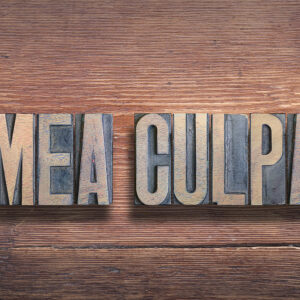Social justice activists forcefully demand that others repent for the sins of their fathers. Such requests undermine the sacred Judeo-Christian tenets of confessions.
In the Catholic faith, those as young as seven (the age of reason) know a good confession starts with a genuine and comprehensive examination of their consciences. Catholic children spend a year understanding how to make a good confession. Understandably, children fret about getting the list of their sins “right,” not only confessing mundane acts but also coming clean about the most grievous. Conversely, priests don’t expect the confessors, of whatever age, to conjure sins they hadn’t committed.
Thus, in Christianity, a sinner must ask for forgiveness from the Almighty, for only God has the power to forgive a sinner. But in Judaism, a sinner must both ask for G-d’s forgiveness and apologize to the person perceived to have been wronged; the holiest day of the year is Yom Kippur, The Day of Atonement, the fasting-day when Jews are closest to G‑d and to the essences of their souls.
A cottage industry has developed around coaching people how to apologize when they have been told that they and their ancestors have crossed people and entire populations. Ignored are protestations that there was never any intent to offend anyone and/or any group. The “awake” Americans are told apologizing for their presumably bad historical acts against a variety of demographic groups is the “right” thing to do, and they must be voiced absent “ifs, ands, or buts.”
Unlike other living creatures, humans can think critically, feel empathy, and sense a personal conscience. Some may hold that dolphins can think and that domestic animals and primates can “feel our pain.” But high-level empathy expected of humans is reflective, transformative, and aims to make things whole for the ones insulted, even if symbolically. The brain and the heart may have progenitors, but not so the soul.
In Catholicism, asking for forgiveness for something you did not do is just as worthless as not mentioning a bad act to the priest in the box and expecting absolution. The Kol Nidrei ensures Jews aware of the plethora of “all (unfulfilled) vows” will have plenty of authentic work to do as the new year commences.
In stark contrast, far too much attention is paid in our public sphere to scrutinizing the post-mortems of apologies by politicians, athletes, celebrities, and business leaders. Those who should know better are entrapped in the process of chest-beating, a faux pas that too often explodes with an intensity that rivals the assignment of point scores by Olympic judges.
The swinging pendulum seems stuck at the extreme of progressivism, browbeating Americans to compose apologia that would renounce people and “systems” over which they never exercised control, all to justify a form of socialist wealth transfer code-named “reparations.”
Those demanding such no-contest apologies constitute an aggregate of self-appointed judges, juries, and sentencers; this grievance society is divorced from our traditional legal and moral system of American Exceptionalism.
Forced apologies for ghost acts are akin to compelling an individual to cough up a charitable donation, undermining Christian Voluntarism and Maimonides’ Eight Levels of Tzedakah. Discomfiture is provoked by a disingenuous, excuse-ridden, blame-game gratuitous apology … replete with irrelevant facts clogging clarity, credibility, and authenticity … such as those proffered by an off-script/off-teleprompter politician.
Those who feel culpable for the sins of their fathers should couple their revelations with cogent actions, exemplified by how Jesuit priests of the Roman Catholic Church pledged $100 million to atone for buying and selling slaves. And the absence of any aberrant “history” doesn’t stop Israel from routinely dispatching emergency assistance to disaster areas around the world.
Magnanimous people and reflective organizations manifest this Judeo-Christian Ethic by giving time, talent, and treasure to others whom they feel they may have wronged. Indeed, the art of apologizing and asking for forgiveness is so natural that it emerges through religious training starting in kindergarten.
However, progressives who demand apologies from people whom they know not to be culpable serves only to taint this sacred process.
Ultimately, those who refuse to cast their eyes downward apologetically, do so knowing that such an act is exclusively directed toward the Deity. Forced or gratuitous apologies cheapen what many hold to be uniquely human and gratefully divine.

